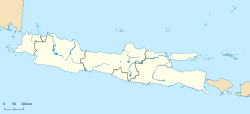Malang | |
|---|---|
| City of Malang Kota Malang | |
| Local transcription(s) | |
| • Javanese | Malang (Gêdrig) مالاڠ (Pégon) ꦩꦭꦁ (Hånåcåråkå) |
| • Osob Kiwalan | Ngalam (Gêdrig) ڠالام (Pégon) ꦔꦭꦩ꧀ (Hånåcåråkå) |
| • Chinese | 瑪琅 Mǎláng (Pinyin) Má-lông (Hokkien POJ)[1] |
| Nickname(s): Paris Of Java Kota Bunga (Flower City) Kota Industri Jasa dan Ekonomi Kreatif (City of Service Industry and Creative Economy) | |
| Motto(s): | |
 Location within East Java | |
| Coordinates: 7°58′48″S 112°37′12″E / 7.98000°S 112.62000°E | |
| Country | |
| Region | Java |
| Province | |
| Settled | 760 |
| Incorporated (City) | April 1, 1914 |
| Government | |
| • Mayor | Wahyu Hidayat (Acting) |
| • Vice Mayor | Vacant |
| Area | |
| • City | 111.08 km2 (42.89 sq mi) |
| • Urban | 1,132.7 km2 (437.3 sq mi) |
| • Metro | 2,156.6 km2 (832.7 sq mi) |
| Elevation | 506 m (1,660 ft) |
| Population (mid 2023 estimate) | |
| • City | 847,182 |
| • Density | 7,600/km2 (20,000/sq mi) |
| • Urban | 2,795,209 |
| • Urban density | 2,500/km2 (6,400/sq mi) |
| • Metro | 3,663,691 |
| • Metro density | 1,700/km2 (4,400/sq mi) |
| [2] | |
| Demonym(s) | Malangan, Arema[3] |
| Time zone | UTC+7 (IWST) |
| Postal Code | 6511x–6514x |
| Area code | (+62) 341 |
| Vehicle registration | N |
| Nominal GDP[4] | 2023 |
| - Total | |
| - Per capita | |
| - Metro | |
| - Growth | |
| HDI (2023) | |
| Airport | Abdul Rachman Saleh Airport |
| Website | malangkota |
Malang (/mɒˈlɒŋ/; Javanese: ꦏꦸꦛꦩꦭꦁ, romanized: Kutha Malang, Indonesian: Kota Malang "Sorrowful City"), historically known as Tumapel, is an inland city in the Indonesian province of East Java. It has a history dating back to the age of the Singhasari Kingdom. It is the second most populous city in the province, with a population of 820,043 at the 2010 Census[5] and 843,810 at the 2020 Census;[6] the official estimate as of mid-2023 was 847,182 (comprising 421,340 males and 425,842 females).[2] The Malang Metropolitan area (Greater Malang) was home to 3,663,691 inhabitants in 2010, spread across two cities (Malang itself and Batu) and 22 districts (21 in Malang Regency and one in Pasuruan Regency). [7] Malang is the third largest city by economy in East Java, after Surabaya and Kediri, with an estimated 2016 GDP at Rp. 44.30 trillion.[8]
The city is well known for its mild climate. During Dutch colonization, it was a popular destination for European residents. Even now, Malang still holds its position as a popular destination for international tourists.[9] Malang keeps various historical relics. This city keeps relics of the Kingdom of Kanjuruhan period until the Dutch period.[10] The existence of Dutch heritage in general is in the form of ancient buildings such as the Kayutangan church and Ijen Cathedral which employ Gothic architecture. Malang also holds various events to preserve its cultural heritage, one of which is Malang Tempo Doeloe Festival. There is also a lot of historical heritage which has become a landmark like Tugu Malang (Alun-alun Bundar). Additionally, Malang is well-known because of its label as an educational city. Two of the best universities in Indonesia are in Malang, namely Brawijaya University and Malang State University.[11]
Malang has various ethnic groups and cultures from all over Indonesia and the world. The population of Malang comprised 847,192 people in mid-2023, with a majority of Javanese, followed by the Madurese, and Chinese or Peranakan.[12] Malang extended urban area, notable known as Malang Raya, is the second largest in East Java after Gerbangkertosusila (Surabaya Metropolitan Area). From the perspective of Javanese culture, the majority of Malang people belong to Arekan Javanese culture.[13]
Malang was spared many of the effects of the Asian financial crisis, and since that time, it has been marked by steady economic and population growth.[14]
- ^ 蘇, 鴻賓 (1936). 荷屬東印度地名辭典 (PDF). 國立曁南大學海外文化事業部.
- ^ a b Badan Pusat Statistik, Jakarta, 28 February 2024, Kota Malang Dalam Angka 2024 (Katalog-BPS 1102001.3573)
- ^ "Arti kata Arema – Kamus Besar Bahasa Indonesia (KBBI) Online". artikata.simomot.com. Archived from the original on 16 September 2018. Retrieved 8 October 2018.
- ^ Badan Pusat Statistik (2024). Provinsi Jawa Timur Dalam Angka 2024. Surabaya: Badan Pusat Statistik.
- ^ Biro Pusat Statistik, Jakarta, 2011.
- ^ Cite error: The named reference
Badan Pusat Statistik 2021was invoked but never defined (see the help page). - ^ "Indonesia: Java (Regencies, Cities and Districts) – Population Statistics in Maps and Charts". www.citypopulation.de.
- ^ Badan Pusat Statistik (2017). Produk Domestik Regional Bruto Kabupaten/Kota di Indonesia 2012–2016. Jakarta: Badan Pusat Statistik.
- ^ Planet, Lonely. "Malang – Lonely Planet". Lonely Planet. Retrieved 22 May 2017.
- ^ "Historical Buildings | OIA". Archived from the original on 11 January 2019. Retrieved 18 February 2019.
- ^ Burhanudin, Tony (25 September 2016). "Kota Malang Singkirkan Yogyakarta Sebagai Kota Pendidikan". Portal Lengkap Dunia Marketing (in Indonesian). Archived from the original on 24 December 2016. Retrieved 18 February 2019.
- ^ Ishaq, Hasan (25 January 2017). "Sejarah Kawasan Pecinan Di Kota Malang". Ngalam.co (in Indonesian). Archived from the original on 18 February 2019. Retrieved 18 February 2019.
- ^ Media, Kompas Cyber (20 July 2008). "Kuali Peleburan di Tlatah Jawa Timur". KOMPAS.com (in Indonesian). Archived from the original on 16 February 2018. Retrieved 18 February 2019.
- ^ Duncan Graham, 'Malang: Not an unfortunate city', The Jakarta Post, 17 February 2013.








